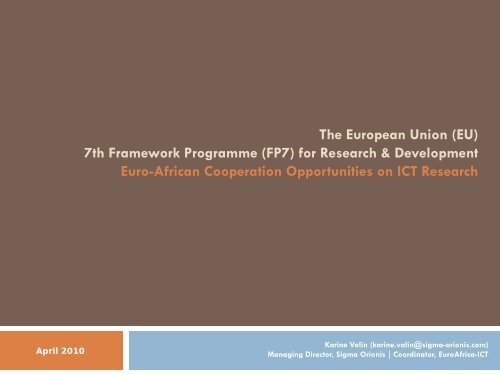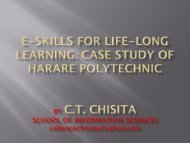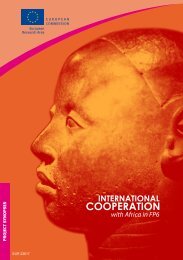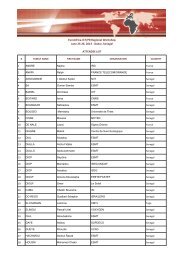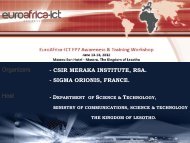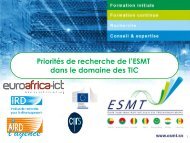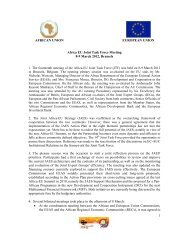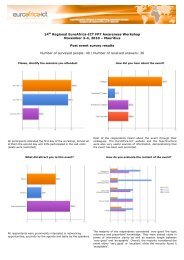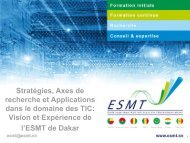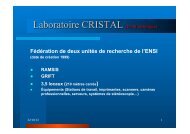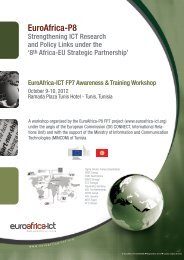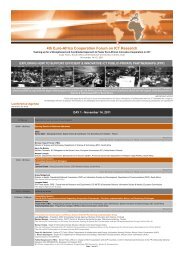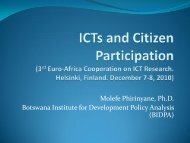The EU 7th Research Programme (FP7) EuroAfrica-ICT Cooperation ...
The EU 7th Research Programme (FP7) EuroAfrica-ICT Cooperation ...
The EU 7th Research Programme (FP7) EuroAfrica-ICT Cooperation ...
Create successful ePaper yourself
Turn your PDF publications into a flip-book with our unique Google optimized e-Paper software.
What does the <strong>EU</strong> do?5• <strong>The</strong> European Union acts in a wide range of policy areas (economic, social, regulatory andfinancial) where its action is beneficial to the member States:‣ Solidarity policies (also known as cohesion policies) in regional, agricultural and socialaffairs‣ Innovation policies (which bring state-of-the-art technologies to fields such asenvironmental protection, R&D and energy)• <strong>The</strong> Union funds these policies through an annual budget which is largely paid for by themember States. It represents a small proportion of the <strong>EU</strong>’s collective wealth (a maximum of1.24 % of the combined gross national income of all member states).<strong>EuroAfrica</strong>-<strong>ICT</strong> (248376) <strong>FP7</strong> ProjectApril 2010
6<strong>The</strong> single market<strong>The</strong> single market• One of the <strong>EU</strong>’s greatest achievements.• Restrictions between member countries on trade & free competition have gradually beeneliminated, with the result that standards of living have increased• <strong>The</strong> single market has not yet become a single economic area: some sectors of the economy(public services) are still subject to national laws• <strong>The</strong> individual <strong>EU</strong> countries still largely have the responsibility for taxation and social welfare• <strong>The</strong> single market is supported by a number of related policies put in place by the <strong>EU</strong> overthe years. <strong>The</strong>y help ensure that market liberalisation benefits as many businesses andconsumers as possible<strong>EuroAfrica</strong>-<strong>ICT</strong> (248376) <strong>FP7</strong> ProjectApril 2010
7<strong>The</strong> Economic & Monetary Union (EMU) / <strong>The</strong> €<strong>The</strong> Economic & Monetary Union (EMU) / <strong>The</strong> Euro• <strong>The</strong> euro is the single currency of the <strong>EU</strong>• <strong>The</strong> euro has been adopted for non-cash transactions from 1999 & for all payments in 2002when euro notes & coins were issued• 3 countries (Denmark, Sweden and the UK) are not participating in this monetary union• <strong>The</strong> new member countries are getting ready to enter the euro area as soon as they fulfil thenecessary criteria• In parallel with the objective of monetary stability (which is the responsibility of the EuropeanCentral Bank) the member States are committed to higher growth & economic convergence<strong>EuroAfrica</strong>-<strong>ICT</strong> (248376) <strong>FP7</strong> ProjectApril 2010
13Euro-African Partnership Agreements in S&T/<strong>ICT</strong>African Ministerial Council on S&T (AMCOST)• Established in 2003 under the auspices of the New Partnership for Africa’s Dvpt (NEPAD) & the AU• A high-level platform for developing policies & setting priorities on S&T, & innovation for African dvpt• Provides political/policy leadership for the implementation of the S&T CPAAfrica S&T Consolidated Plan of Action (CPA)• Developed and adopted by AMCOST• Develop & use S&T for the socio-economic transformat° of the continent & its integration into the world economyAfrican Regional Action Plan on the Knowledge Economy (ARAPKE)• Aims at building a region fully benefiting from <strong>ICT</strong> services by 2015• Developed upon request of the 2 nd African Regional Preparatory Conference for the WSIS (Accra - 2005)• Based on the vision defined by the African Information Society Initiative (AISI) & NEPAD, under the AU leadership• A Regional Action Plan for rolling out the information society in the continent<strong>EU</strong>-Africa Partnership for Science, Information Society & Space (8 th Partnership)• <strong>The</strong> EC & the AUC agreed on a <strong>EU</strong>-Africa Strategic Partnership (<strong>EU</strong>-AU Summit - Lisbon’07)• 8 thematic partnerships identified; the 8th one being “Science, Info. Society, & Space”• To help to bridge scientific & digital divides / To strengthen Africa's base in the S&T field• To enhance the use of <strong>ICT</strong> & space apps as enablers for growth & socio-economic dvpt• A book of 19 lighthouse projects is defined• Among them 2 <strong>ICT</strong> related projects are ready for early implementation• AfricaConnect - Extend the reach of the <strong>EU</strong> research/education high-speed network GEANT to SSA• AXIS - <strong>The</strong> African Internet Exchange Syst. - Enhance Internet deployment/use in Africa
14Euro-African Partnership Agreements in e-Infrastructures<strong>EU</strong>-Africa Partnership on Infrastructures - Interconnecting Africa• Signed in 2007 in Addis Ababa, Ethiopia / Supporting the creation of the <strong>EU</strong>-Africa Infrastructure Trust Fund• Aiming at creating & sustaining regional infrastructure networks & services• Aiming at securing the interconnectivity of the African continent (transport, water, energy & <strong>ICT</strong>) & its differentregions• Aiming at substantially increasing investment in infrastructure & delivery of related servicesAfrican National <strong>Research</strong> and Education Networks (NRENs)• Provide data communications networking facilities to the research & education community on a national basis• Interconnection between NRENs is key• A momentum supported by the African Ubuntunet Alliance (secure affordable high speed internationalconnectivity & efficient <strong>ICT</strong> access/usage for African NRENs)AfricaConnect Project• 1 of the 6 “early deliverables” of the 8 th Partnership• Support the establishment of sustainable & extensible regional backbone networks dedicated to theinterconnection of African NRENs to each other and to the world via the pan-European GÉANT NetworkFEAST feasibility study• Aiming at providing the EC with a roadmap to implement AfricaConnectERINA4Africa Study• Aiming at providing the EC with a study on e-Infrastructures in Africa
15Table of content1. <strong>The</strong> European Union (<strong>EU</strong>)2. <strong>The</strong> European Commission (EC) & the 7 th Framework <strong>Programme</strong> (<strong>FP7</strong>)3. How to submit a project proposal?4. Legal and financial issues5. Success stories & useful links<strong>EuroAfrica</strong>-<strong>ICT</strong> (248376) <strong>FP7</strong> ProjectApril 2010
DG Information Society & Media (DG InfSo)16• One of the DGs (“Ministries”) of the European Commission (EC)‣ Other DGs: <strong>Research</strong>, External Relations (Relex), Development (Dev), etc.Neelie KroesEuropean Commissionerfor the Digital Agenda• Its role‣ Support research on <strong>ICT</strong> (FP6 IST, <strong>FP7</strong> <strong>ICT</strong>)‣ Define & implement the <strong>EU</strong> regulatory environment‣ Encourage <strong>ICT</strong> widespread availability & accessibility‣ Foster the growth of content industries drawing on <strong>EU</strong>’s cultural diversity‣ Represent the EC in international dialogue & negotiations in these fields• Structured in Directorates and Units‣ Among them the International Relations Unit• Contact for cooperation with Africa: Mr Thierry Devars (Project Officer)<strong>EuroAfrica</strong>-<strong>ICT</strong> (248376) <strong>FP7</strong> ProjectApril 2010
<strong>FP7</strong> - Overview17• <strong>FP7</strong> stands for‣ Seventh Framework <strong>Programme</strong> for <strong>Research</strong> & Technological Development• <strong>The</strong> <strong>EU</strong>’s main instrument for funding research in Europe• Support research in selected priority areas• Implemented by the European Commission (EC)• Running from 2007 to 2013• Total budget = 53,2 B€‣ An important budget increase from FP6<strong>EuroAfrica</strong>-<strong>ICT</strong> (248376) <strong>FP7</strong> ProjectApril 2010
<strong>FP7</strong> - Structure18• Made up of 4 main specific programmes‣ Plus a specific programme on nuclear research (Euratom & JRC)‣ Integration of the international dimension into all specific programmes• <strong>The</strong> budget of the “<strong>Cooperation</strong>” specific programme is the largest one‣ 32,4 B€ (around 60% of the total budget)Fundingcollaborative<strong>Research</strong>Caring abouttop-levelresearch(frontierresearch)Supportingresearchers(mobility,PPP)Strzngtheningresearchcapacities<strong>EuroAfrica</strong>-<strong>ICT</strong> (248376) <strong>FP7</strong> ProjectApril 2010
19<strong>FP7</strong> - <strong>Research</strong> areas & activities
<strong>ICT</strong> research in <strong>FP7</strong> - Overview20• <strong>The</strong> <strong>ICT</strong> thematic area is the largest one in the “<strong>Cooperation</strong>” programme‣ With a budget of 9,1 B€ (28% of the total budget)• Under the responsibility of the DG Information Society & Media‣ All other themes under the responsibility of other DGs• <strong>The</strong> <strong>ICT</strong> WP is in line with the policy priorities defined in <strong>EU</strong>’s i2010 initiative‣ “A European Information Society for Growth & Employment”<strong>EuroAfrica</strong>-<strong>ICT</strong> (248376) <strong>FP7</strong> ProjectApril 2010
<strong>ICT</strong> research in <strong>FP7</strong> - Structure21• 7 key challenges‣ And 2 cross-area actions: Future & Emerging Technologies (FET) + Horizontal SupportActionsSOCIO-ECONOMIC GOALSDigital Librariesand Content<strong>ICT</strong> for Health<strong>ICT</strong> for Mobilityand Sustainablegrowth<strong>ICT</strong> forindependent livingand InclusionTECHNOLOGYROADBLOCKSNetwork and ServiceInfrastructuresCognitive systems,Interaction, RoboticsComponents, Systems,Engineering1234 5 6 7<strong>EuroAfrica</strong>-<strong>ICT</strong> (248376) <strong>FP7</strong> ProjectApril 2010
22<strong>ICT</strong> research in <strong>FP7</strong> - <strong>Research</strong> areas<strong>EuroAfrica</strong>-<strong>ICT</strong> (248376) <strong>FP7</strong> ProjectApril 2010
International cooperation within <strong>FP7</strong> - Overview23• A clear dimension of the <strong>FP7</strong> programme to‣ Address issues of common interest & mutual benefit‣ Support European competitiveness through research partnerships with 3rd countries inselected S&T fields‣ Reinforce the <strong>EU</strong>’s external relations & other relevant policy• <strong>FP7</strong> is opened to the participation of organisations from third countries‣ ICPC - International <strong>Cooperation</strong> Partner Countries (developing & emerging economies)‣ Industrialised countries (EC funding being exceptional)• Beyond this general framework‣ Specific International <strong>Cooperation</strong> Actions (SICAs) are implemented under <strong>FP7</strong>‣ <strong>The</strong> “Capacities” specific programme includes an “INCO” programme<strong>EuroAfrica</strong>-<strong>ICT</strong> (248376) <strong>FP7</strong> ProjectApril 2010
International cooperation within <strong>FP7</strong> - <strong>The</strong> <strong>ICT</strong> theme24• All research areas are opened to international cooperation‣ But this dimension is specifically underlined in the 2007-2008 Work <strong>Programme</strong> in certain areas and targeting certain regionsor countries• An horizontal action is devoted to International cooperation‣ Cross-theme (9): horizontal support actions
ETPs & JTIs in <strong>FP7</strong>25• European Technology Platforms (ETPs)‣ Are large open groupings of industry & academic stakeholders in a given field‣ Have produced in particular Strategic <strong>Research</strong> Agendas (SRA) as inputs to the <strong>FP7</strong> Work<strong>Programme</strong>‣ Are well represented in the <strong>ICT</strong> field: 9 ETPs• Joint Technology Initiatives (JTIs)‣ Are in their emergence phase and in a limited number‣ Are mainly generated from ETPs (e.g. Artemis)‣ Aim at setting up ambitious, long term, public private partnerships in a given fieldETPs/JTIs in the <strong>ICT</strong> field<strong>EuroAfrica</strong>-<strong>ICT</strong> (248376) <strong>FP7</strong> ProjectEuropean Nanoelectronics Initiative Advisory Council (ENIAC)Advanced R&D on Embedded Intelligent Systems (ARTEMIS)Mobile and wireless communications technology (eMobility)Integral Satcom Initiative (ISI)Networked and electronic media platform (NEM)Networked European Software and Services Initiative (NESSI)European Robotics Platform (<strong>EU</strong>ROP)Consolidated European Photonics <strong>Research</strong> Initiative (Photonics21)European Platform on Smart Systems Integration (EPoSS)
26Table of Content1. <strong>The</strong> European Union (<strong>EU</strong>)2. <strong>The</strong> European Commission (EC) & the 7 th Framework <strong>Programme</strong> (<strong>FP7</strong>)3. How to submit a project proposal?4. Legal and financial issues5. Success stories & useful links<strong>EuroAfrica</strong>-<strong>ICT</strong> (248376) <strong>FP7</strong> ProjectApril 2010
Why submitting a project proposal to the EC?27• Not only because the proposal - if selected - will be (partially) funded by the EC‣ A grant of 50 to 100% is allocated(depending on the nature of the project, the type of the organisation, etc.)‣ With no rights claimed by the EC(in terms of research results, IPRs, payback scheme, etc.)• But (first & foremost…) because <strong>FP7</strong> is an opportunity for any organisation to‣ Improve its knowledge(<strong>FP7</strong> vision, cooperation framework, planned roadmap, ongoing activities, information,tools, etc.)‣ Benefit from a true collaborative (international) programme / project(contacts, sharing of knowledge & experience, finding complementary skills, etc.)‣ Enhance its image through key references<strong>EuroAfrica</strong>-<strong>ICT</strong> (248376) <strong>FP7</strong> ProjectApril 2010
28What kind of project proposals can be submitted?• A highly innovative R&D project‣ It is R&D (except CSAs)‣ It is not support to deployment nor to commercial initiatives for instance‣ And it is very competitive!(most proposed projects are of high quality and only few are selected!)• Only collaborative projects‣ <strong>The</strong> basic idea is to encourage organisations from <strong>EU</strong> countries (& from third countries) to join their forces(a typical rule of participation is “at least 3 independent legal entities from 3 different MS or AC”)• Projects answering the specification of <strong>FP7</strong> Calls‣ Proposals can be submitted only in response to Calls for proposals &have to strictly answer the specification of the Calls(specific rules for participation, addressed <strong>ICT</strong> areas, expectedprojectoutcomes, foreseen budget per type of project - IP, STREP, SICA, etc.)Type of research funded under <strong>FP7</strong>JointresearchEmergingtechnologyProprietary researchIndustrial product<strong>EuroAfrica</strong>-<strong>ICT</strong> (248376) <strong>FP7</strong> ProjectApril 2010
How to submit a proposal?29• Download the Information package from CORDIS• http://cordis.europa.eu• http://cordis.europa.eu/fp7/dc/index.cfm?fuseaction=UserSite.<strong>Cooperation</strong>DetailsCallPage&call_id=268 (call for Africa)• Carefully read the Guides for applicants• An essential information to guide proposers through the mechanics of preparing andsubmitting a proposal• All proposals shall contain a Part A (administrative forms) and a Part B (proposaldescription)• Indications about the content and issues to be addressed are described in the Guides forApplicants<strong>EuroAfrica</strong>-<strong>ICT</strong> (248376) <strong>FP7</strong> ProjectApril 2010
What is a Call for proposals? - Overview30• <strong>FP7</strong> is implemented through periodic Calls (for proposals)‣ Two per year in average• Again: these Calls are very competitive!‣ Only the best proposals can be funded (50% to 100% of project total costs)• <strong>The</strong> evaluation of received proposals is quickly performed by independent experts onclear evaluation criteria‣ Contracts can typically be signed 4 to 6 months after the Call closure date<strong>EuroAfrica</strong>-<strong>ICT</strong> (248376) <strong>FP7</strong> ProjectApril 2010
31Types & characteristics of eligible projects - Overview• 3 funding schemes / 6 instrumentsProject typeIntegrated project (IP)Specific Targeted <strong>Research</strong>Project (STREP)Specific International<strong>Cooperation</strong> Action (SICA)Network of Excellence (NOE)Coordination Action (CA)Specific Support Action(SSA)AimLarge scale integrating researchprojectSmall to medium scale focusedresearch projectR&D project with developing countriesor emerging economies (ICPC)Integration of research activities andcapacitiesCoordination of research activities andpoliciesSupport to research activities andpoliciesNumber ofpartnersProjectdurationEC contribution10 to 20 36 to 60 months 4 to 25 M€6 to 15 18 to 36 months 1 to 4 M€SICAs did not exist under FP66 to 12 48 to 60 months 4 to 10 M€13 to 26 18 to 36 months 0,5 to 2 M€1 to 15 9 to 30 months 0,03 to 3 M€<strong>EuroAfrica</strong>-<strong>ICT</strong> (248376) <strong>FP7</strong> ProjectApril 2010
32Types & characteristics of eligible projects - In detail• Collaborative Projects (CPs)‣ <strong>Research</strong> projects‣ <strong>Research</strong> aiming at developing new knowledge/technology/products + demonstration activities + common resources forresearch• IPs: ambitious (large scale projects) objective driven research with a “programme approach”• STREPs: objective driven research more limited in scope than IPs (small to medium size scale projects) / focused projects(targeting a specific objective)• SICAs: R&D projects with developing countries or emerging economies (ICPC)• Networks of Excellence (NoEs)‣ Instruments to overcome the fragmentation of the European research landscape in a given area and remove the barriers tointegration‣ Joint programmes for long term cooperation‣ Integration of research activities & capacities‣ Activities to spread the excellence• Coordination & Support Actions (CSAs)‣ Promote & support the ad hoc networking and coordination of research & innovation activities‣ Support to the programme implementation, preparation of future actions, dissemination of results, exchange of information• CAs: coordination of research activities (events / studies / expert groups / coordination of joint initiatives /dissemination of good practice, etc.)• SSAs: support to research activities and policies (designed to underpin the implementation of the EC FPs) (events / WG/ monitoring / fact findings / feasibility studies / awards / operational support / data dissemination / etc.)<strong>EuroAfrica</strong>-<strong>ICT</strong> (248376) <strong>FP7</strong> ProjectApril 2010
33Evaluation criteria• Scientific & technical quality‣ Soundness of concept, quality of objectives (ALL instruments)‣ Progress beyond the state-of-the-art (CP)‣ Contribution to long term integration of high quality S&T research (NoE)‣ Contribution to the coordination of high quality research (CSA)‣ Quality & effectiveness of the S&T methodology & associated work-plan (CP)‣ Quality & effectiveness of the joint programme of activities & associated work-plan (NoE)‣ Quality & effectiveness of the coordination/support action mechanisms & associated work-plan (CSA)• Implementation (ALL instruments)• Impact‣ Appropriateness of the management structures & procedures‣ Quality & relevant experience of the individual participants‣ Quality of the consortium as a whole (complementarity, balance, etc.)‣ Appropriate allocation & justification of the resources to be committed (budget, staff, equipment, etc.)‣ Contribution to the expected impacts listed in the WP under the relevant activity (ALL instruments)‣ Appropriateness of measures for the dissemination/exploitation of results & management of IP (CP)‣ Appropriateness of measures for spreading excellence, exploiting results & disseminating knowledgethrough engagement with stakeholders & the public at large (NoE & CSA)<strong>EuroAfrica</strong>-<strong>ICT</strong> (248376) <strong>FP7</strong> ProjectApril 2010
34Evaluation criteria (all instruments)1.S&T qualitySound concept, andquality of objectives2.ImplementationAppropriateness of themanagement structure andproceduresQuality and relevantexperience of the individualparticipants3.ImpactContribution, at theEuropean and/orinternational level, to theexpected impacts listed in thework programme under therelevant topic/activity<strong>EuroAfrica</strong>-<strong>ICT</strong> (248376) <strong>FP7</strong> ProjectApril 2010
35Evaluation criteria (support actions)1.S/T qualityQuality and effectiveness ofthe support action mechanisms,and associated work plan2.ImplementationQuality of the consortiumas a whole (includingcomplementarity andbalance)Appropriate allocation andjustification of the resourcesto be committed (budget,staff, equipment)3.ImpactAppropriateness ofmeasures for spreadingexcellence, exploitingresults, and disseminationknowledge, throughengagement withstakeholders, and thepublic at large.<strong>EuroAfrica</strong>-<strong>ICT</strong> (248376) <strong>FP7</strong> ProjectApril 2010
36Evaluation criteria - scoring system<strong>EuroAfrica</strong>-<strong>ICT</strong> (248376) <strong>FP7</strong> ProjectApril 2010
Evaluation panels37• <strong>The</strong> panels are composed of independent experts• Experts should be registered in the EC database (see CORDIS)• For the Africa Call, a balanced participation of independent experts from Europe and Africa(and other ICPC countries) is expectedEvaluator registration: http://cordis.europa.eu/experts/home.html<strong>EuroAfrica</strong>-<strong>ICT</strong> (248376) <strong>FP7</strong> ProjectApril 2010
38Table of Content1. <strong>The</strong> European Union (<strong>EU</strong>)2. <strong>The</strong> European Commission (EC) & the 7 th Framework <strong>Programme</strong> (<strong>FP7</strong>)3. How to submit a project proposal?4. Legal and financial issues5. Success stories & useful links<strong>EuroAfrica</strong>-<strong>ICT</strong> (248376) <strong>FP7</strong> ProjectApril 2010
39Minimum conditions for participation• General‣ At least 3 independent legal entities from 3 different <strong>EU</strong> Member States (MS) or Associated Countries(AC) (provided this minimum has been achieved, any number of additional participants from othercountries can be included)‣ JRCs can participate & are deemed to be from a different MS or AC (same principles for internationalEuropean interest organisations & entities established under Community law)‣ Additional conditions can be established by the work- or specific programmes (e.g. number/type ofparticipant, place of establishment, etc.)‣ Sole participants composed of members that meet the criteria above can participate• Specific‣ Coordination & support actions (CSA): minimum of 1 legal entity‣ Collaborative projects for specific cooperation actions dedicated to international cooperation with partnercountries (ICPC) identified in WP (SICAs): min. 4 participants (2 in different MS or AC + 2 in differentICPC countries unless specified in WP)‣ Participation of international organisations & participants from third countries if in addition to minima<strong>EuroAfrica</strong>-<strong>ICT</strong> (248376) <strong>FP7</strong> ProjectApril 2010
<strong>FP7</strong> participating countries40• 27 <strong>EU</strong> Member States (MS)Austria, Belgium, Denmark, Finland, France, Germany, Greece, Ireland, Italy, Luxembourg, Netherlands,Spain, Sweden, Portugal, United Kingdom, Cyprus, Czech Republic, Estonia, Hungary, Latvia, Lithuania,Malta, Poland, Slovakia, Slovenia, Bulgaria, Romania• 3 Associated Candidate Countries (ACC or AC)Croatia, Turkey, Macedonia (FYROM)• 6 Associated States (AS)Iceland, Israel, Liechtenstein, Norway, Serbia and Switzerland• ICPC target countries (emerging & developing countries)Countries neighbouring the <strong>EU</strong>: North Africa / Western Balkans / Eastern Europe / Central AsiaDeveloping countries: ACP countries / Asia (except Japan, Taiwan, Singapore, SK) / Latin AmericaEmerging Economies: China / Brazil / India / Russia / South Africa / Etc.Other “third” countries (USA, Canada, Japan, Australia, Singapore, South Korea, etc.) are considered asindustrialised countries & funded only exceptionally (if essential for carrying out the action / if specified in theWP or a SP / in case of bilateral S&T agreements)<strong>EuroAfrica</strong>-<strong>ICT</strong> (248376) <strong>FP7</strong> ProjectApril 2010
41Eligibility for funding• Legal entities from MS and AC or created under Community law (and JRC)• International European interest organisations• Legal entities established in international cooperation partner countries (ICPC)• International organisations, legal entities established in third countries other than ICPC, ifprovided for in SP or WP; or essential for carrying out action; or provision for funding isprovided for in a S&T bilateral agreement between the <strong>EU</strong> & the third country<strong>EuroAfrica</strong>-<strong>ICT</strong> (248376) <strong>FP7</strong> ProjectApril 2010
42Risk avoidance mechanism• No collective financial responsibility• Commission establishes & operates a participant guarantee fund (contribution to guaranteefund = max. 5% of the EC contribution by each participant, to be returned at the end of theproject)• If interests generated not sufficient to cover sums due to EC, retention of max. 1% of ECcontribution• Exemption of retention for public bodies, higher and secondary education establishments,legal entities guaranteed by a MS/AC<strong>EuroAfrica</strong>-<strong>ICT</strong> (248376) <strong>FP7</strong> ProjectApril 2010
43From the project proposal to the selected project…ProposalpreparationEvaluationNegotiationProject• Submission‣ To be made electronically through a set of documents respecting detailed templates &guidelines, and… in time (strict deadlines!)• Evaluation‣ A fair, transparent & relatively quick process (2-3 months) involving independent expertsworking on the basis of the Call documents and of (public) selection criteria• Negotiation‣ If the proposal is pre-selected, the proposers & the EC work together on the possibility totransform the proposal into a project, on the basis of evaluators’ remarks & comments• Contract‣ (if the negotiation phase is successful) Can be signed between the EC & the projectcoordinator as soon as 4 to 6 months after the submission deadline• Project‣ <strong>The</strong> project can then smoothly develop on the basis of a “Description of Work” (DoW) & ofthe “Contract and its annexes” (administrative & financial issues)‣ its progress will be reviewed by the EC every 6-12 months<strong>EuroAfrica</strong>-<strong>ICT</strong> (248376) <strong>FP7</strong> ProjectApril 2010
Project proposal selection procedure44II - Eligibility Check: ECIII - Evaluation (& hearings): Peer reviewprinciples & independent expertsI - Call for proposalsOfficial JournalCORDISNCPsVI - Information sent to the<strong>Programme</strong> CommitteeIV - Marking & priorityorder of proposals (EC)VII - NegotiationV - Funding scenarii(EC)VIII - Signature of contract<strong>EuroAfrica</strong>-<strong>ICT</strong> (248376) <strong>FP7</strong> ProjectApril 2010
45How to get involved in a project proposal?• If you have a project in mind‣ Read into detail all documents related to the Call you are targeting (WP, call details, selectioncriteria, etc.) to check how your project can fit in and it if fits, go!• Develop your vision into detail• Identify & motivate potential partners bringing targeted skills• Investigate FP6 & <strong>FP7</strong> information to refine the project objectives & the partnership• Attend the pre-Call Information days organised by the EC(& ETP events for instance) to better position your proposal & establish contacts• If you want to be involved in projects under construction‣ Contact the organisations you already know & who may submit proposals. Ask for their support!‣ Attend pre-Call events & investigate FP6-<strong>FP7</strong> information to identify the projects in which your skillscould be useful, & the organisations preparing proposals you could contact• In both cases, be ready to invest!‣ Driving a good proposal or convincing a third party to take you on board a proposal requires a lot oftime and efforts but… is worthwhile!<strong>EuroAfrica</strong>-<strong>ICT</strong> (248376) <strong>FP7</strong> ProjectApril 2010
46How to prepare a good project proposal?• Make sure, all along the proposal preparation period, that the proposal answers thespecification of the Call• Watch the competition to better position your proposal‣ (and be ready for alliances if appropriate)• Keep the EC informed‣ (during EC events or at any time; EC contact persons are designated for each <strong>ICT</strong> area)‣ (and duly take into account their informal remarks…)• Make sure your proposal is of high quality‣ (during the preparation process, periodically have your proposal evaluated by persons not involved in theproposal preparation; ask them to use the same background information & selection criteria theevaluators will)‣ (during the evaluation process the evaluators will start reading the proposal 1/2 page summary and willhave to be 90% convinced after this…)<strong>EuroAfrica</strong>-<strong>ICT</strong> (248376) <strong>FP7</strong> ProjectApril 2010
47Table of Content1. <strong>The</strong> European Union (<strong>EU</strong>)2. <strong>The</strong> European Commission (EC) & the 7 th Framework <strong>Programme</strong> (<strong>FP7</strong>)3. How to submit a project proposal?4. Legal and financial issues5. Success stories & useful links<strong>EuroAfrica</strong>-<strong>ICT</strong> (248376) <strong>FP7</strong> ProjectApril 2010
48Success StoriesFlossWorld (www.flossworld.org)Strengthening Europe's leadership in research into FLOSS and open standardsCouncil for Scientific and Industrial <strong>Research</strong> (South Africa) / University of the Western Cape (South Africa)SIMBA (www.simbaproject.org)Transforming road transport through worldwide cooperationInfrastructure System Operations and ITS Laboratory (South Africa)IRMA (www.irma.lu)Building a reference platform suitable for the management of natural and environmental risks in AfricaCSIR (South Africa) / Centre de Suivi Ecologique (Senegal) / Ecole Nationale Supérieure de Yaoundé (Cameroon) / UT<strong>ICT</strong> (Moz.)<strong>EuroAfrica</strong>-<strong>ICT</strong> (www.euroafrica-ict.org)Strengthening cooperation on <strong>ICT</strong> research between Europe & Sub-saharan AfricaMeraka Institute (South Africa) / PANOS (Senegal) / KIST (Rwanda) / Makerere University (Uganda)Digital World (www.digitalworldforum.eu)Using <strong>ICT</strong> to leverage economic development in Africa (and Latin America)CSIR (South Africa) / One Village Fundation (Ghana, Nigeria)BEANISHBuilding Europe- Africa collaborative Network for applying IST in health care sectorMinistry of Education, S&T (Botswana) / University of Dar-Es-Salaam (Tanzania) / Eduardo Mondlane (Mozambique) / University ofMalawi (Malawi) / Addis Ababa University (Ethiopia) / University of Western Cape (South Africa)
Useful links49• <strong>The</strong> <strong>EU</strong>’s web portal (23 languages!) http://europa.eu/• <strong>The</strong> European Commission http://ec.europa.eu/• DG Information Society and Media (DG Infso) http://ec.europa.eu/dgs/information_society/• <strong>The</strong> International relations Unit of DG Infso http://cordis.europa.eu/ist/international/• European Technology Platforms http://cordis.europa.eu/technology-platforms/• <strong>FP7</strong> http://cordis.europa.eu/fp7• <strong>FP7</strong>/<strong>Cooperation</strong>/<strong>ICT</strong> http://cordis.europa.eu/fp7/cooperation/ict_en.htm• <strong>FP7</strong>/Africa Call http://cordis.europa.eu/fp7/dc/index.cfm?fuseaction=UserSite.<strong>Cooperation</strong>DetailsCallPage&call_id=268• <strong>EU</strong>’s i2010 initiative http://ec.europa.eu/i2010• National Contact Points (NCP) http://cordis.europa.eu/fp7/ncp_en.html• <strong>FP7</strong> contacts in 3rd countries http://cordis.europa.eu/fp7/third-countries_en.html• Cordis partners service http://cordis.europa.eu/partners-service/• <strong>EU</strong>-Africa Partnership http://africa-eu-partnership.org/aueu/pages/templates/home.jsp?subkey=1&locale=en• <strong>EuroAfrica</strong>-<strong>ICT</strong>.org www.euroafrica-ict.org• eI-Africa www.ei-africa.eu<strong>EuroAfrica</strong>-<strong>ICT</strong> (248376) <strong>FP7</strong> ProjectApril 2010
50No wrong expectations … It is competition!<strong>EuroAfrica</strong>-<strong>ICT</strong> (248376) <strong>FP7</strong> ProjectApril 2010
51Thank you for your attention / Questions?Karine ValinManaging Director, Sigma OrionisCoordinator, <strong>EuroAfrica</strong>-<strong>ICT</strong> & eI-Africa <strong>FP7</strong> Projectskarine.valin@sigma-orionis.comTel: +33 / (0) 493 958 530 - Fax: +33 (0) 493 001 560www.euroafrica-ict.org - www.ei-africa.eu


